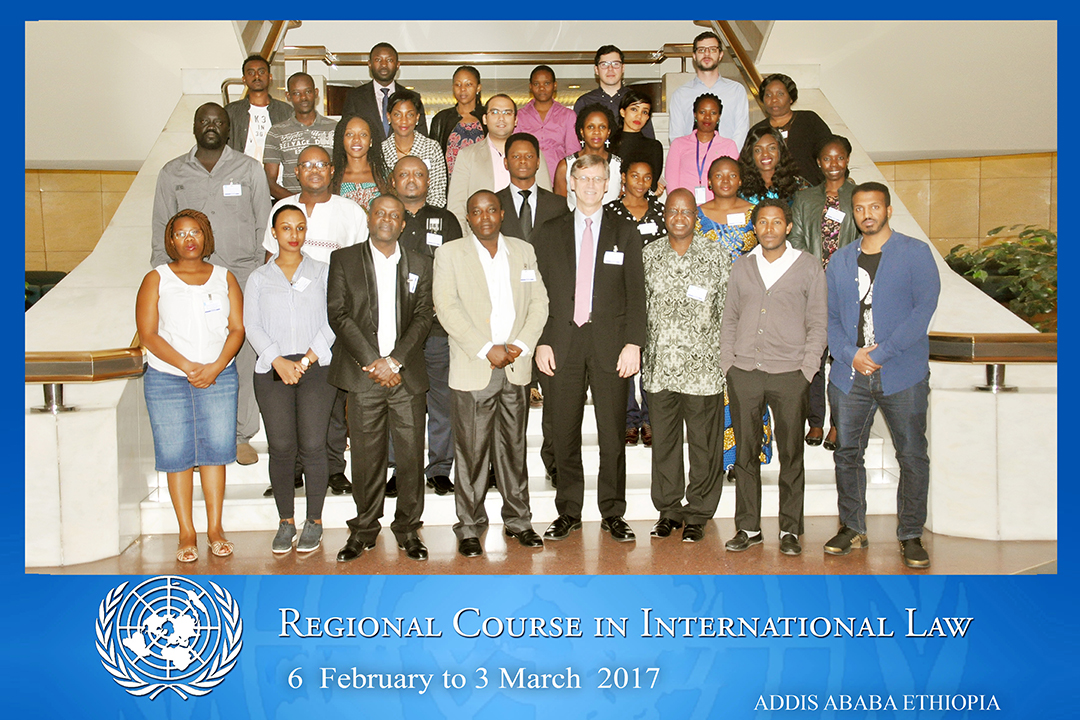Professor Sean D. Murphy, Patricia Roberts Harris Research Professor of Law, traveled to Addis Ababa, Ethiopia, in late February to teach the law of the sea in the United Nations Regional Course in International Law for Africa. The four-week course brings together about thirty lawyers from across the African continent, who are mostly working for their foreign or justice ministries, for intensive instruction on the field of international law from twelve prominent instructors.
Since you served as an instructor, what led you to teach the law of the sea?
There are about 54 African States, of which only about 16 are land-locked, so there is great interest in the international rules and institutions associated with the law of the sea. Indeed, all coastal States in Africa have important economic interests in the natural resources of the sea, such as fish or offshore oil and gas, and the navigation of vessels to and from other States. Even African land-locked States, such as Ethiopia, have interests in securing access to maritime spaces for trade, and can flag vessels just like any other State.
For those who may not be familiar with the law of the sea, can you briefly explain it?
The law of the sea is one of the oldest branches of international law, which operated for centuries based on the customary practices of States, with an emphasis on high seas freedoms outside a relatively narrow (three or four nautical miles) belt of territorial sea accorded to coastal States. With the rise of maritime trade and technologies by the mid-twentieth century, which resulted in much greater competition for ocean resources, there was a need to codify and elaborate upon the rules, which culminated in the 1982 United Nations Convention on the Law of the Sea, to which almost 180 (out of about 193) States are now party. Perhaps the most complicated and lengthy treaty of all time, it systematically regulates pretty much all aspects of two-thirds of our planet, notably through the recognition of various maritime zones: the territorial sea, in which the coastal State has sovereignty; the contiguous zone, relevant for the coastal State's law enforcement; the exclusive economic zone and continental shelf, where the coastal State has sovereign rights to natural resources; the deep seabed, whose resources are to be shared by all States; and the high seas. It includes compulsory dispute settlement, such as the arbitral tribunal that recently decided the Philippines/China dispute over the South China Sea.
How much time did you have with the participants? Were they familiar with this topic?
I lectured for 12 hours over the course of two days, though my lectures mostly consisted of me asking questions to the participants to promote classroom discussion. In addition to that, we had ample opportunity to chat about the topic during coffee breaks and lunches. Familiarly with the law of the sea among the participants was mixed; these were mostly young lawyers just embarking on their careers in African governments. Some may have had a course on international law in law school, but that's it, with just passing treatment of the law of the sea. So it was a great opportunity to dig deeper into the subject, and I tried to do it using numerous examples relevant to Africa, such as current maritime boundary disputes between Ghana and Côte d'Ivoire or between Kenya and Somalia.
Describe your experience in Ethiopia.
Ethiopia is a wonderful country, with a rich cultural heritage and extraordinary, friendly people. It's a major player in continent-wide issues; for example, the African Union is based in Addis Ababa. In terms of this particular program, what struck me was how, over the course of the four weeks, the participants were developing deep friendships and bonds, which I suspect will endure in the years to come as they serve their respective governments. One likes to think that those personal connections may play a significant role in helping to promote peaceful cooperation and the rule of law in Africa.
The Regional Courses provide high-quality training by leading scholars and practitioners from different regions and legal systems on a broad range of core subjects of international law, as well as specific subjects of particular interest to the countries in a given region. In addition, the interactive nature of the training allows the participants to share experiences and exchange ideas, which promotes greater understanding and cooperation on legal matters in the region. To learn more, visit this page.


